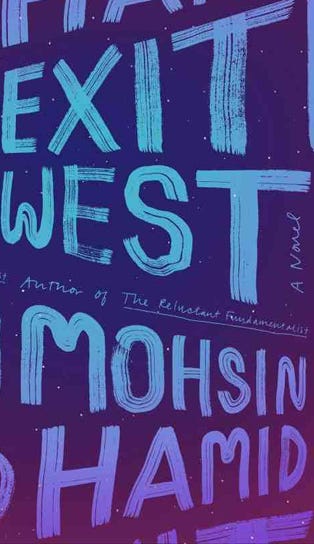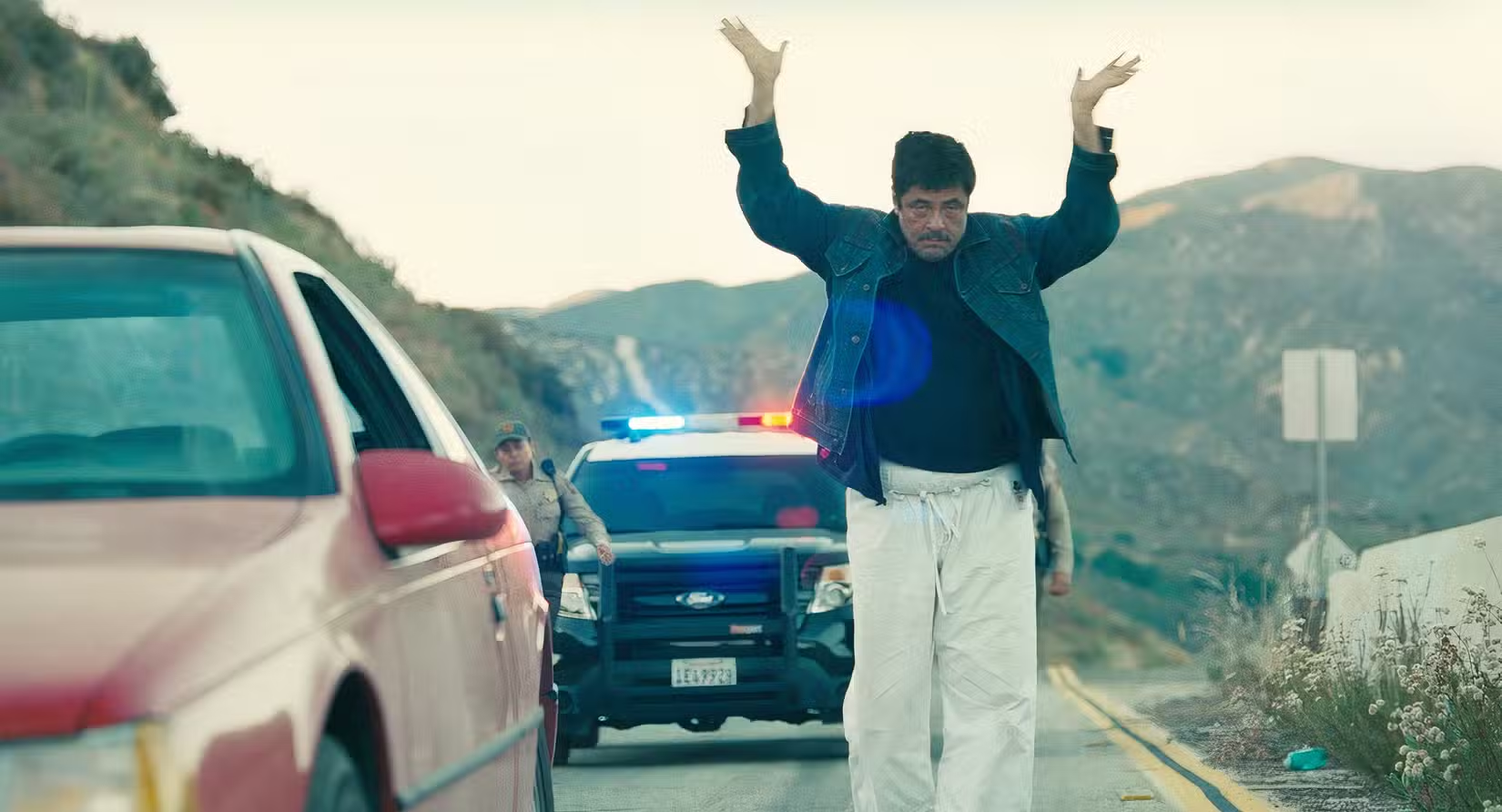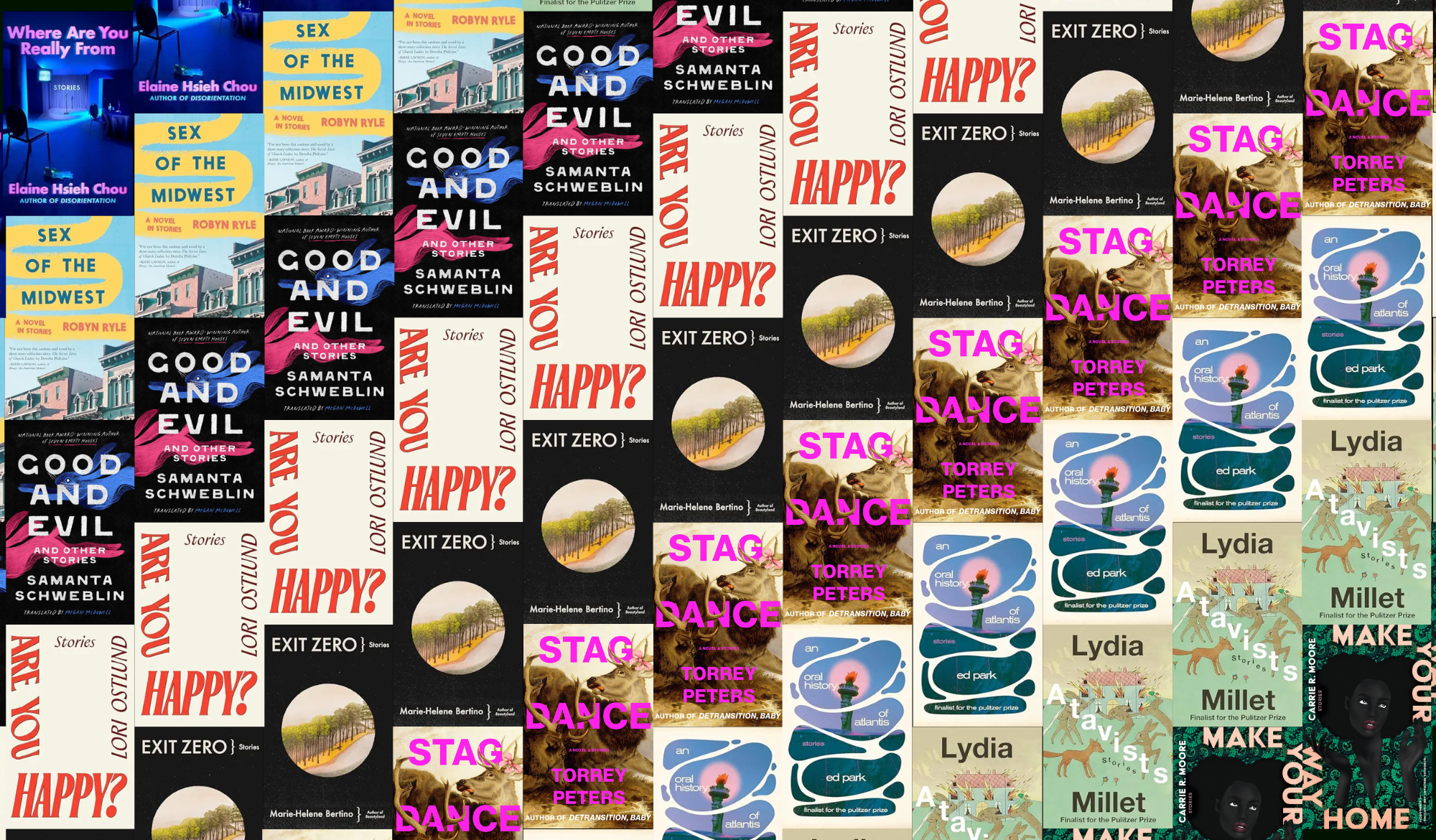interviews
Double Take: Love During the Brink of Global War
Mohsin Hamid’s Exit West is a heartfelt and magical novel

Double Take is a literary criticism series wherein a book goes toe-to-toe with two authors as they pick apart and discuss its innermost themes, its successes and failings, trappings and surprises. In this entry, Gabino Iglesias and Hannah Lillith Assadi delve into one of March’s most buzzworthy and exciting titles, Mohsin Hamid’s Exit West. In the novel, two characters, Nadia and Saeed, meet and soon fall into a deep love affair; all the while, the city around them teeters on the brink of civil war. Soon they have no choice but to leave their homeland and old lives behind. As you’ll see in Hannah and Gabino’s discussion, Exit West is a heartfelt and harrowing narrative that transports the reader to a world so alien and torn while, at the same time, introducing two characters the reader won’t soon forget.

Gabino Iglesias: During the process of reading the book, there were a few little things I kept noticing, and was curious about. One, for example, is the fact that the city is nameless. I know the violence is real — the severed heads, disappearing buildings, military violence, and even the guys playing soccer with a human head are pulled from real life — but given the surreal elements in the novel and the fact that the author never names the destroyed city, it sounds like he (or perhaps it was an editorial choice?) wanted to create extra space between the narrative and reality, a space where fiction acts as a cushion, so that readers can focus on the developing relationship between the main characters.
Hannah Lillith Assadi: The fable like quality of the narration and the unnamed city is indeed interesting, and I agree with you that perhaps the author’s intention was to draw us into the story of the relationship between Saeed and Nadia versus setting the novel in a place where we could draw parallels to the news (and as a result potentially get distracted by the real facts of that place).
The decision to keep that city unnamed vis-a-vis the Western places that are, i.e. Mykonos, London, Marin, was also powerful to me. Often, when we speak of terrible things in the news, we use proper nouns to summarize the horrific: The siege of Aleppo, the protests at Standing Rock, conflict in the Congo. Hamid’s refusal to name the place from which the two protagonists flee makes it, in some ways, more present and immediate to the reader. Though it is obviously foreign (to a Western audience), it is still a town that houses an apartment with a lemon tree, a place where two people smoke joints and hook up, a place where underground music is played, a place where people pray, and — yes — a place where people are killed, and parents die. It doesn’t matter that it has a name. It’s home to these characters. More home than London, Marin, etc.
Oddly it was not in the moments of bloodshed (the severed heads, the disappearing buildings), but in the moments where magic begins to enter the lives of the protagonists, I found myself brought to tears by the book. In some ways, it captured the desperation of a world that only magic and magical doors can resolve.
GI: I agree with you on that special sense of “home” Hamid manages to make us feel through his characters. I also found the way Saeed’s father, prayer, and at one point even smoking a joint also became “home.” It’s just one of those small things that made it an outstanding read. I’d also like to add the way Hamid looks at telephones, social media, and the inexplicable sense of drifting apart Nadia and Saeed start feeling, which, at least for me, brought about the most emotional passages in the novel. What were your favorite elements and why?
“There is also the motif throughout the book […] of the way our technological connectivity reflects the network of lights in cities.”
HLA: It’s interesting that you also noticed the way technology is treated in this novel. On the one hand, the characters’ phones’ function almost like the magical doors offering passage out of their war-torn reality and then, of course, later in the novel as a distancing device once the relationship begins to fall apart. The phones are another symptom of the mass surveillance system used to track the migrants across the world. There is also a very disorienting scene depicting Nadia not knowing whether the photo she is seeing on her phone of a woman in robes is indeed her at that very moment and whether she is living two realities — one virtual and one corporeal.
Despite the terrifying capacity of the technology we carry with us now, I think the book provides one of the most forgiving portraits of the way these devices add solace to our lives. For instance, when the signal is switched off on all mobile phones in Saeed and Nadia’s home city, it is almost more terrifying for them than the bombs falling around them — that feeling of being marooned without contact.
There is also the motif throughout the book, which I found quite moving, of the way our technological connectivity reflects the network of lights in cities. The way that darkness can be beautiful when thinking of the Milky Way cast over the cities of New York, Paris, etc. in a French photograph but when it happens — i.e. when London goes dark over the migrants — it can be utterly terrifying.
“Hamid manages to dissect [characters drifting apart] without having to explain it.”
GI: Yes! The scene with Nadia looking at Nadia/not-Nadia made me pause mid-reading for a few minutes. It appears, with his relaxed style and straightforward storytelling, Hamid generated a conversation with academics like Jean Baudrillard while exploring the shifting nature of mediated identity. I thought that was brilliant. The same goes for the way he used light sources, both artificial and natural. And I love that you bring connectivity to the discussion because the motif runs throughout the narrative in technological and emotional form. Just like electricity comes and goes, we see a change in the way Nadia and Saeed perceive each other.
Hamid makes us feel like this is a natural process because “personalities are a single immutable color, like white or blue, but rather illuminated screens, and the shades we reflect depend much on what is around us.” In a way, his treatment of their drifting apart became, through a few passages as great as the one I just quoted, the inevitable theme of the novel that I knew would come back to haunt me in the shape of a question.
We’ve all been there and there is plenty of fiction that tackles this growing sense of distance between two people, but I think Hamid manages to dissect it and expose without having to explain it. That touched a nerve with me. How did you react to the last third of the book?
HLA: Unlike most reading experiences I’ve had, where the last third is where I feel the most moved, with this book, it was the first third of the novel that pulled at my heartstrings. Regarding the tragedy that befalls Saeed’s parents, his mom being killed and his father left behind, I felt more tugged into that sense of inevitable distancing that most of us must face in this life — away from our families and toward our potential partners.
I think I truly began to weep on the train when Saeed leaves his father like that knowing they would never see one another again. The stakes in that departure felt so much more critical than Nadia leaving the shanty in Marin and beginning her new life. This isn’t a criticism just a statement on what spoke to me emotionally. I was very satisfied with the end, but it was more as if I had gone on a journey with characters that resolved itself elegantly and comfortably rather than tore my heart into pieces which is probably a good thing given all they had been through.
One thing I wondered about was the interspersed departures from the Nadia/Saeed narrative to the auxiliary characters whose stories Hamid tells — including the maid in the end in Marrakesh, the older woman living in Palo Alto, the sleeping woman in Australia, etc. It felt to me those small anecdotes were being used to mimic the globalization of the “refugee issue” (for lack of a better term). When I reached those sections, I wondered if the novel would have functioned as well without them. Not to nitpick a near masterpiece but it was just one of the techniques Hamid uses that sometimes tripped me up, other times really moved me.
Double Take: John Darnielle’s Universal Harvester
GI: I don’t think the departure or Saeed’s losses made me sadder than the average narrative centered on “loss,” but there was a line that — as an immigrant who left home and family behind — made me stop: “…when we migrate, we murder from our lives those we leave behind.” Hamid is a fantastic author and he knew there were plenty of words he could have used here, but he went with murder, and that made the line striking and powerful. This is one of those rare novels that understands Otherness at its core and shares it with readers. I love encountering such novels, and enjoy watching them succeed and generate buzz, especially when they deal with these tough themes.
I’m glad you brought those auxiliary characters into the discussion! At first, I thought that, as happens in other narratives, those stories/lives were somehow going to collide in a meaningful way. They never did. Maybe he was letting us know that the experience is, as you say, a global one that’s repeated in countries worldwide. Maybe he knew that the Nadia/Saeed binomial was heavy with emotional grit and he wanted to give readers a small reprieve; while not entirely “light,” the sections recounted things that happen to characters we’re not as emotionally invested in. I’m not saying my answer is applicable to everyone, but as a book critic, I think the novel would have worked just as well without those narrative parentheses.
“This is one of those rare novels that understands Otherness at its core and shares it with readers.”
HLA: Yes, that line is particularly powerful and echoed toward the end as Hamid closes on the anecdote of the old woman living in Palo Alto: “We are all migrants through time.” Perhaps what affected me so much about leaving the father was the violence of the departure (despite its magical qualities) — through a one-way door, versus the distancing between Nadia and Saeed later on in the book, which was far more graceful and organic. Something like a murder.
It’s certainly a pleasant thing to witness all the buzz generating around this book given its politically relevant undercurrent (and its beauty). I wonder what sort of attention this book would have received had it been published two or three years ago, when the refugee crisis in Syria and elsewhere was just as horrific, but not as prevalent on our radar in the States.
In general, and to steer away from the book as it exists in and of itself, and to examine its reception, I find it endlessly fascinating that the press and the industry celebrates a narrative that manages to portray aesthetically what’s already dominant on the news. As if we need fiction to “name” the thing, personalize it for us, make it human. This is more a question of what fiction can do and what it does well. On the other hand, are novels subject to the “right place, right time” of journalism? Has it always been this way? Can they ever stand alone?
Since you asked my experience of reading this on an emotional level, I want to ask you how you experienced the novel, reading it as an immigrant yourself as you mention below. I’m the daughter of a Palestinian refugee but I was born and raised in this country. We all have lenses through which we read, and I know that I have some distant family members who disappeared from Syria a few years ago. Some turned up in Europe, some did not. A few may have drowned in the sea. I can’t deny that Hamid didn’t name the home city of Nadia and Saeed, I imagined it as a city in Syria in my own mind. Did you have a place in mind while reading?
“I find it endlessly fascinating when the press celebrates a narrative that manages to portray aesthetically what’s already dominant on the news. As if we need fiction to ‘name’ the thing, personalize it for us, make it human.”
GI: Indeed, I think the book deserves to be described as beautiful. It’s one of those strange narratives that make you say, “You should read it! I mean, it’ll hurt, but the hurt will be so, so good.”
In terms of the novel’s reception, my guess is it has something to do with the “Hollywoodification” of everything. There is a great love story here. It’s framed in a way that overpowers everything else. Details become huge. Feelings become a world. Maybe that has something to do with it?
Strangely enough, I also had Syria in mind. I’m sure it has to do with that photo of Alan Kurdi, the drowned refugee boy whose tiny body we all saw on the shore. More than any other of the many horrific images we’ve seen, that one stuck with me. If you care about fellow humans, it’s hard to keep Syria out of your mind for long, and that’s where my head went once devastation made itself present in the novel.
There is a multiplicity of migration types, and mine belongs to the “good” side of the spectrum. I call my mother every day. I can go home at any time. Even if I got to put up with folks complimenting my English and “subtle” accent. I have an American passport. For others, like the family members you mention, their story is different. Their leaving home is wrapped in dark uncertainty and danger.
Reading Exit West, there were some passages that struck a chord, lines that made me feel that all migrants share a universe. However, there were some strong differences. I had a friend who died in the streets, face down in the gutter. They ended up that way because of gangs and drugs, not politics and war. Between young men dying in the streets and men playing soccer with a human head there is a large gap, and it’s one that I have thankfully never crossed.
HLA: It’s interesting you speak of those dying in the streets from drugs versus those dying in war zones, but I think of the streets as another sort of war zone albeit ones not with bombs falling but with bags and cash exchanged for self-destruction.
I, too, experienced my fair share of early death among those I loved, many from drugs and I chose to write into that grief. I’ve always felt personal loss as a galaxy of pain in its own rite.
You brought up the love story, which I realize, we haven’t touched on much. I did find it particularly moving but not at all in the bombastic Hollywood way. It seems to me in Hollywood one of them would have to die or disappear to accommodate the screen lust for romantic tragedy. But in Exit West, they only drift apart after coming through so much together, and that felt so true. Maybe I’m contradicting myself to what I said earlier but such is the reading life.
I’m so glad it ended as it did, the two encountering one another as strangers just as the book began, in their home city, still dreaming of the Atacama.
GI: It’s so true. The streets are a war zone. In countries all over the world, street life has claimed more young people than war itself.
What I was trying to unwrap and make sense of earlier was how Exit West is, at its heart, a love story but it feels so much more about war and death. It felt real and the narrative has, as you mention, an ending that is both believable and perfect for the narrative.
“The streets are a war zone. In countries all over the world, street life has claimed more young people than war itself.”
HLA: I completely agree — in the way the love story in The English Patient creates sympathy across supposed enemy lines in the desert, this story humanizes the Otherness of Nadia and Saeed. There are details that still linger with me, which is how I know I won’t be soon forgetting this book: the lemon tree, Nadia’s records, her emotion for the girl in Mykonos, the father witnessing that horrific soccer game.
GI: There’s a lot of imagery in the novel that sticks with you. For me, it also left a lingering sense of unease: If these two souls go through so much together and still drift apart, how are the rest of us going to build truly meaningful, lasting relationships?








